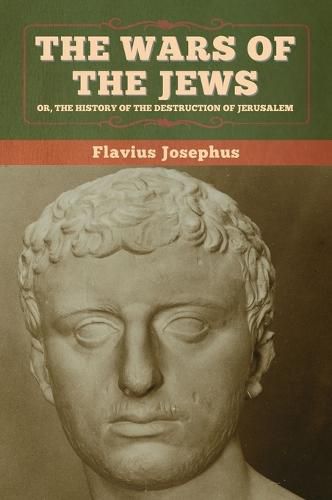Readings Newsletter
Become a Readings Member to make your shopping experience even easier.
Sign in or sign up for free!
You’re not far away from qualifying for FREE standard shipping within Australia
You’ve qualified for FREE standard shipping within Australia
The cart is loading…






This title is printed to order. This book may have been self-published. If so, we cannot guarantee the quality of the content. In the main most books will have gone through the editing process however some may not. We therefore suggest that you be aware of this before ordering this book. If in doubt check either the author or publisher’s details as we are unable to accept any returns unless they are faulty. Please contact us if you have any questions.
Titus Flavius Josephus born Yosef ben Matityahu was a first-century Romano-Jewish historian who was born in Jerusalem–then part of Roman Judea–to a father of priestly descent and a mother who claimed royal ancestry.
He initially fought against the Romans during the First Jewish-Roman War as head of Jewish forces in Galilee, until surrendering in 67 CE to Roman forces led by Vespasian after the six-week siege of Jotapata. Josephus claimed the Jewish Messianic prophecies that initiated the First Roman-Jewish War made reference to Vespasian becoming Emperor of Rome. In response Vespasian decided to keep Josephus as a slave and presumably interpreter. After Vespasian became Emperor in 69 CE, he granted Josephus his freedom, at which time Josephus assumed the emperor’s family name of Flavius.
Flavius Josephus fully defected to the Roman side and was granted Roman citizenship. He became an advisor and friend of Vespasian’s son Titus, serving as his translator when Titus led the Siege of Jerusalem in 70 CE. Since the siege proved ineffective at stopping the Jewish revolt, the city’s destruction and the looting and destruction of Herod’s Temple (Second Temple) soon followed.
Josephus recorded Jewish history, with special emphasis on the first century CE and the First Jewish-Roman War (66-70 CE), including the Siege of Masada. His most important works were The Jewish War (c. 75) and Antiquities of the Jews (c. 94). The Jewish War recounts the Jewish revolt against Roman occupation. Antiquities of the Jews recounts the history of the world from a Jewish perspective for an ostensibly Greek and Roman audience. These works provide valuable insight into first century Judaism and the background of Early Christianity, although not specifically mentioned by Josephus. Josephus’ works are the chief source next to the Bible for the history and antiquity of ancient Palestine. (wikipedia.org)
$9.00 standard shipping within Australia
FREE standard shipping within Australia for orders over $100.00
Express & International shipping calculated at checkout
This title is printed to order. This book may have been self-published. If so, we cannot guarantee the quality of the content. In the main most books will have gone through the editing process however some may not. We therefore suggest that you be aware of this before ordering this book. If in doubt check either the author or publisher’s details as we are unable to accept any returns unless they are faulty. Please contact us if you have any questions.
Titus Flavius Josephus born Yosef ben Matityahu was a first-century Romano-Jewish historian who was born in Jerusalem–then part of Roman Judea–to a father of priestly descent and a mother who claimed royal ancestry.
He initially fought against the Romans during the First Jewish-Roman War as head of Jewish forces in Galilee, until surrendering in 67 CE to Roman forces led by Vespasian after the six-week siege of Jotapata. Josephus claimed the Jewish Messianic prophecies that initiated the First Roman-Jewish War made reference to Vespasian becoming Emperor of Rome. In response Vespasian decided to keep Josephus as a slave and presumably interpreter. After Vespasian became Emperor in 69 CE, he granted Josephus his freedom, at which time Josephus assumed the emperor’s family name of Flavius.
Flavius Josephus fully defected to the Roman side and was granted Roman citizenship. He became an advisor and friend of Vespasian’s son Titus, serving as his translator when Titus led the Siege of Jerusalem in 70 CE. Since the siege proved ineffective at stopping the Jewish revolt, the city’s destruction and the looting and destruction of Herod’s Temple (Second Temple) soon followed.
Josephus recorded Jewish history, with special emphasis on the first century CE and the First Jewish-Roman War (66-70 CE), including the Siege of Masada. His most important works were The Jewish War (c. 75) and Antiquities of the Jews (c. 94). The Jewish War recounts the Jewish revolt against Roman occupation. Antiquities of the Jews recounts the history of the world from a Jewish perspective for an ostensibly Greek and Roman audience. These works provide valuable insight into first century Judaism and the background of Early Christianity, although not specifically mentioned by Josephus. Josephus’ works are the chief source next to the Bible for the history and antiquity of ancient Palestine. (wikipedia.org)